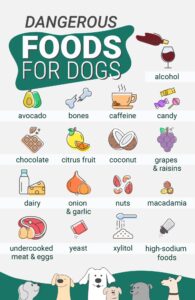Keep Your Dog Safe: 17 Foods That are Dangerous and Should Never be Fed to Them

Although our dogs may seem eager for what we have, this doesn’t necessarily mean they should consume it. Human digestive systems differ significantly from those of dogs; we enjoy many foods which they cannot digest or that may even be toxic to them.
Assuming you may share food with your pup, it is crucial that you know which items they should and should not consume.
In this article, we cover some of the most dangerous foods to feed to your dog and why.
Your Dog Shouldn’t Eat There are 17 Dangerous Foods That Your Dog Shouldn’t Eat
Please feel free to use this image, however we do ask that you link back to Petkeen.com so we may give our credit.
 Dogs are animals that only require meat as part of their diet, with fruits and vegetables providing additional beneficial nutrients. You should be selective when feeding your canine friends as this food could contain potentially toxic elements that are hazardous.
Dogs are animals that only require meat as part of their diet, with fruits and vegetables providing additional beneficial nutrients. You should be selective when feeding your canine friends as this food could contain potentially toxic elements that are hazardous.
1.Alcohol
Image Credits: Pixabay
A beer or glass of wine can help ease stress after an exhausting day; however, any form of alcohol consumption – even just trace amounts in food items such as drinks – can be hazardous for dogs, leading to vomiting and diarrhea in many instances.
As is true for humans, alcohol consumption will induce depression in an animal’s central nervous system and may even result in difficulty breathing, tremors, coma or even death if consumed in excess. Their bodies simply are not designed to process this substance. If you think your pet may have consumed any alcohol-containing products, contact an Animal Poison Control Center or your veterinarian immediately for help.
Slicing Avocado for Avocado Slaw
Avocados might be considered a superfood by humans, but dogs typically don’t tolerate it well. While horses and birds tend to struggle more with digesting it than dogs do, large quantities can still pose cardiovascular issues for our four-legged friends.
3.Bones
We know we shouldn’t give our dogs bones, but what about all those sold at pet stores around the country? Aren’t these dangerous enough for our pups already?
No. Bones from animals that have been cooked directly differ significantly from pet food company processed bones, though you could still give your dog bones from livestock such as livestock but bird bones may splinter and cause issues in their throat. Furthermore, cooked bones could splinter and get stuck.
4.Caffeinated coffee beans
Image Credits: Alexas_Fotos, Pixabay
We may enjoy our daily cup of java, but our dogs should avoid it. Coffee contains an ingredient called methylxanthines that when consumed by your pup can lead to vomiting and diarrhea as well as excessive thirst, urination, panting, hyperactivity, tremors seizures seizures even death – meaning you get all of that goodness all for yourself.
5.Candy assorted Candies
Sugar should not be part of your dog’s daily diet. There may be occasions where they enjoy trying something sweet, but too much can have devastating results for both your pup and themselves. Candy and its preservatives may lead to hyperactivity and elevated heart rates while overeating may eventually cause diabetes as well as unwanted weight gain.
6.Chocolate
Image Credits: anncapictures, Pixabayalitat Chocolate falls into both categories of candy and coffee as its cacao seed contains methylxanthines that are toxic for dogs, so any chance to indulge should be denied them. Dark chocolate contains the highest percentage of cacao content; baking chocolate also poses risks; even white chocolate containing low levels of methylxanthines should not be fed to your dog as treats!
7.Citrus Fruit on Pixabay
Image Credits: Condruzfm and Pixabay for this image You might have seen those funny videos featuring people trying to feed their dogs lemons; while entertaining and amusing, this practice should not be encouraged for their ongoing health. Citrus fruits contain citric acid which may cause irritation and even some swelling within your pup’s mouth and throat area.
Over-indulgence in citrus fruit may lead to depression in one’s central nervous system; however, this usually requires large doses. A smaller amount might not cause more than an upset stomach.
8.Coconut Coconut
Image Credits: Pixabay
Coconut is not as likely to cause allergic reactions in your dog as chocolate or coffee would, although you should still exercise caution with small amounts. Coconut products, like oil or flour should not harm them in small quantities; however, fresh coconut milk can sometimes cause loose stool or diarrhea so exercise caution when offering anything that contains coconut.
9.Grapes (That Include Raisins) Grapes and raisins can be highly toxic to dogs. Researchers have yet to establish what compounds within grapes cause this reaction in animals; if your dog consumes even small quantities, this could result in kidney failure and possibly even death.
10.Macadamia Nuts on eBay (Browse Here for Available Stock and Product Options).
Do you long to experience Hawaii’s tropical shores? A macadamia nut may seem deliciously textural to us humans, but they’re almost guaranteed to cause weakness in limbs, vomiting, depression, tremors and hyperthermia in dogs if consumed – these symptoms usually show within 12-24 hours but should subside by themselves within 48 hours or so.
11.Dairy Products/ Milk
Image Credits: Pickpik Animals such as dogs and cats lack the enzyme lactase needed to digest lactose effectively, leading to diarrhea and vomiting symptoms in some instances. Therefore, you should avoid feeding your pup cheese, dairy-based sauces and milk products as much as possible.
12.Nuts
You should never feed your dog nuts of any type. However, this excludes peanuts as they are legumes rather than nuts.
Nuts like almonds, pecans and walnuts can exacerbate pancreatitis when eaten regularly; their high content of fats and oils often lead to vomiting and diarrhea symptoms.
13.Onions and Garlic for Health.
Image Credits: Shutterbug75 and Pixabay Whilst any Allium plant may cause digestive irritation in humans, specifically onions, chives, and garlic; in cats they are even more sensitive. Overeating can have severe repercussions for their red blood cells resulting in anemia. Likewise dogs that overindulge may also become quite ill as their bodies try to process too many vegetables at one time.
14.Undercooked Meat and Eggs for Dogs_Zontica_shutterstock
Image Credits: Zontica and Shutterstock for Use. You might think your dog shouldn’t have any problem eating raw meat since their ancestor, the powerful wolves, were capable of attacking and eating almost any animal raw. Unfortunately, as time has progressed and dogs have evolved over time, many processes that allow them to digest raw foods have disappeared from them.
Raw meat and eggs could contain bacteria like salmonella and E. coli that can quickly harm your dog’s digestive system. Raw eggs also contain an enzyme called avidin which reduces absorption of biotin which could eventually lead to skin and coat issues for your pup.
15.High-Sodium Foods
These snacks often contain excessive levels of salt. Eating too much salt isn’t good for your dog either – as in humans it leads to thirst and urination issues.
Overconsumption of sodium ion in your dog’s system can eventually lead to poisoning and lead to symptoms including diarrhea, vomiting, depression, an elevated body temperature, tremors and even death. Avoid giving them pretzels, potato chips or salty popcorn snacks.
16.2 bowl of Xylitol for use in baking applications
Image Credits: morisfoto and Shutterstock
Xylitol is an artificial or natural sweetener used in all sorts of products to add flavor, from baked goods and candy bars to gum, toothpaste, and toothpaste. Unfortunately for our pets however, too much ingested could result in liver failure if consumed too frequently over time; prolonged ingestion could even cause hypoglycemia to set in over time.
If your dog reacts immediately and violently to it, signs could include vomiting, loss of coordination, lethargy and seizures – bring them immediately to a vet for evaluation and care.
17.Cristian Storto/Shutterstock for Brewer’s Yeast II
Image Credit: Cristian Storto/Shutterstock
When digested, yeast dough can produce uncomfortable gas and pressure in your dog’s system, potentially leading to serious discomfort or even life-threatening bloat. Your pup should never consume raw bread dough made with yeast as this could potentially wreak havoc with their digestive tract and be potentially fatal – nor should he consume baked goods made using yeast-raising processes like yeast bread.








Hi, this is a comment.
To get started with moderating, editing, and deleting comments, please visit the Comments screen in the dashboard.
Commenter avatars come from Gravatar.